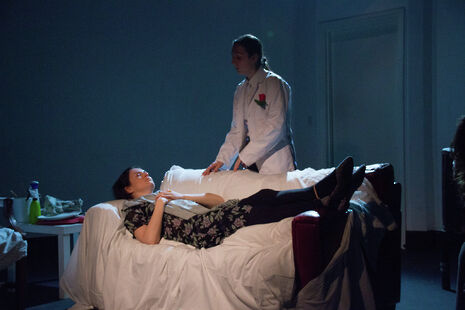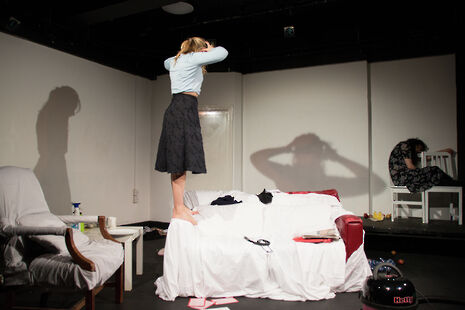The Clean House review: ‘nuanced, explorative, and ultimately affecting’
Sarah Ruhl’s The Clean House is a challenging script to work with, but director Phoebe Segal and the cast brought the play to life with a stunning level of subtlety and sensitivity

As a show grounded in love (both familial and romantic), solidarity, forgiveness, language, and – of course – cleanliness, Sarah Ruhl’s The Clean House binds a tricky mix of themes together with an often deadpan brand of quirky humour that favours understatement over melodrama and demands a significant level of emotional investment from the audience. As such, the script necessitates an ominous level of subtlety and sensitivity for a student production, but this show certainly rose to the occasion.
Though styled as a ‘romantic comedy’, The Clean House takes an unusual stance towards laughter. While the actors’ interactions are consistently comic and well-pitched to the audience, their characters display an unusual amount of respect and reticence towards humour. Matilde (Victoria Zanotto) sees her parents’ marriage and, consequently, her heritage as utterly steeped in joke-telling. Virginia (Jessica Phillips) is afraid of her own laughter as an ugly sound best kept under wraps, and Ana (Isabel Siragusa) confronts her recurrent breast cancer with a last wish to die laughing. The script’s reflexive attitude towards comedy thus demanded a performance style which teased out the conceits and humour from each character in a self-aware manner without completely dispelling the naturalism of their interactions.
This posed quite the challenge, but the cast rose admirably to it. Rachel-Marie Weiss’ Lane was a particular standout, with Weiss’ flair for understated comic delivery accentuating her comparatively austere character from start to finish, but Victoria Zanotto and Evie Butcher also deserve mention for the respective vivacity and affability they brought to their roles.
Admittedly, this balance between dry characterisation and sensitive interaction was not always perfectly negotiated. The show’s mid-section in particularly struggled as a transition point from the lighter opening scenes into the more affecting final third, and it was challenging to gauge how seriously certain characters were meant to be treated, and, accordingly, how deeply to invest in their arcs.
Fortunately, this ambiguity was thankfully smoothed over as various characters were developed to the full. The closing scenes of the play were vastly cohesive and made retrospective sense of ambiguities in the preceding sections. The sense of companionship which developed between the initially disparate cast was remarkably touching and delicately presented; characters whose scripting had earlier bordered upon two-dimensional (Lane and Virginia in particular) become considerably more sympathetic and the closing of the play was charged with a rare tenderness. The specifics of the final scenes are not to be spoiled but suffice to say that the cast took a potentially ridiculous scenario and extracted a moving atmosphere for it that left a powerful, lasting impression without sacrificing any of the dry humour that underpinned the rest of the show.

The multicultural elements of the play were equally striking and made for a refreshing presence on a Cambridge stage. The cultural differences that underscored early interaction between the Brazilian Matilde and her American employer Lane were colourfully articulated, while subtitled Spanish and Portuguese dialogue between Matilde and Ana later in the show made for an animate, effuse contrast with the more deadpan English conversations that ran through the rest of the play. Here Zanotto and Siragusa alternate freely between all three languages in a display of loquacity that is both convincingly upbeat and greatly enjoyable to witness, and this scene alone is indicative of the value added by Latin characters to an otherwise potentially stale American drama.
However, the show was not fully supported by certain aspects of its production value. Whilst effective at points in suggesting minimalism and cleanliness, the set was oddly sparse for a romantic comedy set largely within the same living room, and the white walls of Corpus exercised an unusual degree of aesthetic dominance in certain scenes. The impression of a more embellished domestic space would have reinforced the conflict between dirt and cleanliness that drives much of the interaction in the first half of the play, and would have supported many of its most powerful moments, such as when Virginia (Jessica Phillips) discovers her long-repressed instinct for untidiness in delightfully volatile fashion. Indeed, Phillips’ shredding of magazines and scattering of laundry was so engaging that I was convinced she would soon transfer her efforts to the paintings, curtains and bookshelves that the set behind her failed to provide.
This semblance of an incomplete set, a disappointing publicity campaign that failed to widely disseminate an excellent design (credit to Ed Bankes), and a bafflingly small production team from which, among others, a set designer and stage manager are notably absent, indicates a level of behind-the-scenes coordination less rigorous than it may have been. The producer may have benefitted from recruiting a larger team, as many of these failings were easily within the scope of rectification.
This is a shame because the acting and direction hit the mark and made for what was otherwise an occasionally bemusing but overall excellent show. The staging showed occasional boldness (such as Zanotto and Siragusa tossing a trove of half-eaten apples off the edge of a metrodeck platform, and Butcher lugging the best part of a tree across the stage in an amusing silent intermission), but maintained a sensitive focus on the characters and their interrelation. Director Phoebe Segal deserves credit for bringing a challenging script to life in a nuanced, explorative, and ultimately affecting manner. It’s a pity that the Corpus Playroom was rather under-attended; this review can hopefully stand as an encouragement to fill those seats. This bittersweet comedy is very much worth a watch.
The Clean House is on at the Corpus Playroom until 10 March
 News / Colleges charge different rents for the same Castle Street accommodation2 March 2026
News / Colleges charge different rents for the same Castle Street accommodation2 March 2026 News / News in Brief: waterworks, wine woes, and workplace wins 1 March 2026
News / News in Brief: waterworks, wine woes, and workplace wins 1 March 2026 News / Angela Merkel among Cambridge honorary degree nominees27 February 2026
News / Angela Merkel among Cambridge honorary degree nominees27 February 2026 News / Climate activists protest for ‘ethical careers policy’1 March 2026
News / Climate activists protest for ‘ethical careers policy’1 March 2026 News / King’s hosts open iftar for Ramadan3 March 2026
News / King’s hosts open iftar for Ramadan3 March 2026








